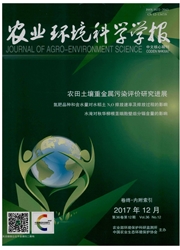

 中文摘要:
中文摘要:
矿化作用和硝化作用是土壤氮素转化的主要途径,通过室内培养试验,对设施和露天栽培方式下有机菜地土壤氮素的矿化与硝化作用进行了比较研究。结果表明,除培养第1d外,设施有机菜地土壤氮素矿化量、矿化率在整个培养期间都显著高于露天有机菜地土壤;设施有机菜地土壤硝化量、硝化率在培养前两周内高于露天有机菜地土壤;设施有机菜地土壤矿化与硝化作用总体比露天有机菜地土壤强烈。矿化作用可能与全氮、C/N、微生物活性关系密切,而硝化作用强弱可能与微生物活性有关。无论施肥与否,设施有机菜地土壤N2O排放速率在培养期间总体高于露天有机菜地土壤,前者N2O累积排放量显著高于后者,这可能与土壤C/N有关。
 英文摘要:
英文摘要:
Organic agriculture has been developing rapidly in China in recent years. Organic vegetables are generally grown under greenhouse and open-air cultivation systems. These two cultivation systems may differ in soil nitrogen transformation processes such as mineralization and nitrification. However,the scientific literature regarding the nitrogen mineralization and nitrification in organic vegetable soils under greenhouse versus open-air cultivation systems is rare. A laboratory soil incubation experiment was conducted to compare nitrogen mineralization and nitrification in organic vegetable soils under greenhouse and open-air cultivation systems. The amount of mineralized nitrogen and the ratio of mineralized nitrogen to total nitrogen in greenhouse organic vegetable soils were significantly greater than those in open-air cultivation soils over the 28-day incubation period,except for the first day. Also,the amount of nitrified nitrogen and the ratio of nitrified nitrogen to mineralized nitrogen were greater in greenhouse organic vegetable soils than in open-air cultivation soils during the first two weeks of the incubation. Overall,the mineralization and nitrification were more intensive in greenhouse cultivated organic soils than in open-air cultivated soils. Greater nitrogen mineralization in greenhouse cultivated organic soils might be related to total nitrogen,C/N and microbial activity,while increased nitrification was probably attributed to microbial activity. With or without fertilization,the N2O fluxes from greenhouse organic soils were higher than those from open-air organic soils,which might be related to C/N of the soils.
 同期刊论文项目
同期刊论文项目
 同项目期刊论文
同项目期刊论文
 Methane and nitrous oxide emissions from organic and conventional rice cropping systems in Southeast
Methane and nitrous oxide emissions from organic and conventional rice cropping systems in Southeast 期刊信息
期刊信息
